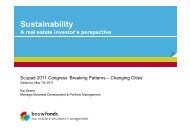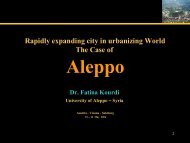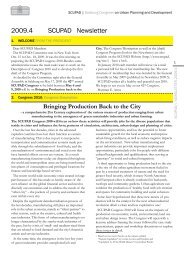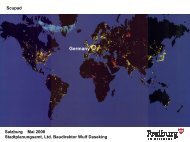The Case of Beirut: From Urban Reconstruction to ... - SCUPAD
The Case of Beirut: From Urban Reconstruction to ... - SCUPAD
The Case of Beirut: From Urban Reconstruction to ... - SCUPAD
You also want an ePaper? Increase the reach of your titles
YUMPU automatically turns print PDFs into web optimized ePapers that Google loves.
<strong>Beirut</strong>, Twenty Years Later: Could Post-War<br />
<strong>Reconstruction</strong> Result in New Conflicts?<br />
Bruno Marot, PhD Candidate, McGill University/Sciences Po Paris
“<strong>Beirut</strong> in times <strong>of</strong> peace has been<br />
more disfigured and destroyed than in times <strong>of</strong> war”<br />
✓ <strong>Beirut</strong> has still <strong>to</strong> manage complex urban policy-making issues<br />
related <strong>to</strong> local recovery, modernization, and civil reconciliation<br />
✓ <strong>The</strong> impact <strong>of</strong> the private-led megaproject <strong>of</strong> down<strong>to</strong>wn<br />
regeneration over <strong>Beirut</strong>’s urban development and reconstruction<br />
✓ <strong>The</strong> impact <strong>of</strong> the megaproject over peacebuilding and conflict<br />
exacerbation in Metropolitan <strong>Beirut</strong>
1- <strong>The</strong> 1990s <strong>Reconstruction</strong> Strategy:<br />
A Market-Oriented Megaproject <strong>of</strong> Down<strong>to</strong>wn Redevelopment
Single public decision <strong>to</strong> privatize the<br />
reconstruction as the onset <strong>of</strong> a<br />
planning-related causal chain<br />
Official objective <strong>of</strong> reconstruction is<br />
primarily economic<br />
Political and economic vision rooted in<br />
the early 1990s neoliberal turn <strong>of</strong><br />
Western urban narrative<br />
Channelling <strong>of</strong> foreign and diasporic<br />
capital through the reconstruction <strong>of</strong><br />
the built environment
<strong>The</strong> most salient planning rationale<br />
for this political and economic model:<br />
✓ An exclusionary approach<br />
developing an “Island <strong>of</strong> Modernity<br />
and Prosperity”<br />
✓ A tabula rasa strategy with the<br />
radical transformation <strong>of</strong> urban<br />
space<br />
✓ A pr<strong>of</strong>it-oriented masterplan
No comprehensive vision or masterplan <strong>to</strong> provide a legal and<br />
planning framework for the reconstruction <strong>of</strong> the entire <strong>Beirut</strong><br />
metropolitan area<br />
Assessing the short-term impacts <strong>of</strong> this redevelopment process<br />
and envisioning its medium and long-term consequences<br />
A planning-related causal chain that could jeopardize the fragile<br />
political stability in Lebanon
2. <strong>The</strong> Spread <strong>of</strong> <strong>The</strong> Practices <strong>of</strong> Down<strong>to</strong>wn’s Market-Led<br />
<strong>Reconstruction</strong> Over Adjacent Neighborhoods
Solidere would be the starting point <strong>of</strong> a powerful gentrification<br />
process<br />
Gentrification: the socio-economic and political process by which<br />
low-income communities are displaced from an area and replaced<br />
by middle- or upper-class households<br />
Specific conflict-related consequences in post-war cities
2.1 <strong>The</strong> socioeconomic mechanism<br />
<strong>of</strong> gentrification in neighborhoods<br />
adjacent <strong>to</strong> Solidere<br />
A process <strong>of</strong> speculative building<br />
practices, based on unplanned projects <strong>of</strong><br />
demolition/reconstruction<br />
Major differences with down<strong>to</strong>wn’s context<br />
<strong>The</strong> strategy <strong>of</strong> real estate developers<br />
<strong>to</strong>wards owners<br />
A change in housing supply generating a<br />
substantial inflation <strong>of</strong> prices on housing and<br />
land markets
2.2 A Creeping Politization <strong>of</strong> the<br />
Production <strong>of</strong> <strong>Urban</strong> Space?<br />
Gentrification seems <strong>to</strong> be<br />
<strong>to</strong>lerated by political groups<br />
Encounter between market-led<br />
urban production and political<br />
takeover on specific neighborhoods<br />
Would political groups benefit<br />
from gentrification?
3. <strong>The</strong> Potential Outcomes <strong>of</strong> Gentrification<br />
Low-income households may experience a forced<br />
residential mobility from CBD’s peripheral<br />
neighbourhoods<br />
A class-based discrimination contributing <strong>to</strong><br />
building pockets <strong>of</strong> poverty and segregation in<br />
<strong>Beirut</strong>’s metropolitan areas<br />
Increase in horizontal inequality between<br />
Municipal <strong>Beirut</strong> (Solidere and its adjacent<br />
neighbourhoods) and its periphery
Key findings<br />
Certain kinds <strong>of</strong> reconstruction could<br />
exacerbate violence and tension in<br />
post-war cities<br />
Gentrification may generate political<br />
conflict through the reinforcement<br />
<strong>of</strong> inequality<br />
Could market-led practices <strong>of</strong><br />
reconstruction bring post-war cities <strong>to</strong><br />
a more radical and terri<strong>to</strong>rialized<br />
stage <strong>of</strong> contention?
Thanks for your attention!<br />
Contact:<br />
Bruno Marot<br />
PhD Candidate - McGill University<br />
Associate Researcher - Sciences Po Paris<br />
bruno.marot@mail.mcgill.ca
References<br />
Pictures: www.ironews.com; www.worldviewcities.org; Reuters/C. Karam; Ragab, 2010; Solidere; www.executivemagazine.com<br />
Krijnen, M. (2010). Facilitating Real Estate Development in <strong>Beirut</strong>: A Peculiar <strong>Case</strong> <strong>of</strong> Neoliberal Public Policy.<br />
Unpublished Master’s <strong>The</strong>sis, <strong>Beirut</strong>: American University <strong>of</strong> <strong>Beirut</strong>.<br />
Majal (2010). New Developments/Developers Research: Preliminary Report. <strong>Beirut</strong>: Institut d’<strong>Urban</strong>isme de<br />
l’Académie Libanaise des Beaux-Arts (ALBA) – University <strong>of</strong> Balamand.<br />
Ragab, T. S. (2010). <strong>The</strong> Crisis <strong>of</strong> Cultural Identity in Rehabilitating His<strong>to</strong>ric <strong>Beirut</strong>-Down<strong>to</strong>wn. Elsevier, Cities, 28,<br />
107-114.<br />
Saliba, R. (2000). Emergency Trends in <strong>Urban</strong>ism: <strong>The</strong> <strong>Beirut</strong> Post-War Experience. Retrieved December, 7th 2011<br />
from www.csbe.org/Saliba-Diwan/essay1.htm.<br />
Schmid, H. (2006). Privatized <strong>Urban</strong>ity or a Politicized Society? <strong>Reconstruction</strong> in <strong>Beirut</strong> after the Civil War.<br />
European Planning Studies, 14:3, 365-381.<br />
Tabet, J. (1993). Towards a Master Plan for Post-War Lebanon. In Khalaf, S., Khoury P., (Eds.), Recovering <strong>Beirut</strong>:<br />
<strong>Urban</strong> Design and Post-War <strong>Reconstruction</strong> . Leiden: Brill<br />
Verdeil, E., Fagour, G., Velut, S. (2007). Atlas du Liban: Terri<strong>to</strong>ires et Société. <strong>Beirut</strong>: Institut Français du Proche-<br />
Orient / CNRS Liban.<br />
Verdeil, E. (2001). <strong>Reconstruction</strong>s Manquées à Beyrouth : la Poursuite de la Guerre par le Projet Urbain. Les<br />
Annales de la recherche urbaine, 91, 65-73.












